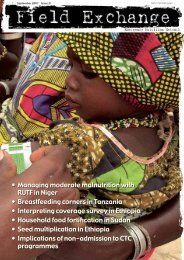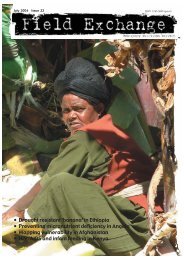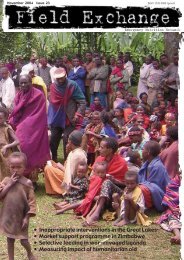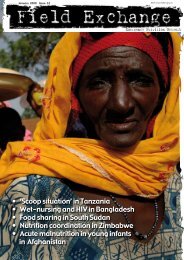Download a PDF of this issue - Field Exchange - Emergency ...
Download a PDF of this issue - Field Exchange - Emergency ...
Download a PDF of this issue - Field Exchange - Emergency ...
You also want an ePaper? Increase the reach of your titles
YUMPU automatically turns print PDFs into web optimized ePapers that Google loves.
Evaluation<br />
There is a need for greater fluency within the<br />
organisation in applying streamlined human<br />
resources (HR) systems that better support<br />
emergency recruitment (like the use <strong>of</strong> generic<br />
terms <strong>of</strong> reference and the quicker adoption <strong>of</strong><br />
recruitment systems that can fast-track staff<br />
appointments, inductions and entry to the<br />
programme).<br />
While the organisation has a comprehensive<br />
financial management system, the experience<br />
<strong>of</strong> the team in trying to link programme outputs<br />
with donor contracts to facilitate contract<br />
management has been a challenging one and<br />
would benefit from review.<br />
Coverage<br />
Concern has performed well against the coverage<br />
criterion, choosing to launch a multi-sectoral<br />
response which targeted both urban and rural<br />
communities. Given the extraordinary nature <strong>of</strong><br />
the crisis, an extraordinary response was<br />
required. While it means that Concern has had to<br />
work hard to deliver against such a large<br />
programme, it has done so successfully.<br />
Relevance<br />
The programme has maintained its relevance<br />
throughout the response by providing a mix <strong>of</strong><br />
targeted assistance (through cash for work and<br />
livelihoods programmes) and blanket distribution<br />
<strong>of</strong> basic commodities. While the context <strong>of</strong><br />
the crowded urban environment has made it<br />
difficult at times to attain minimum standards,<br />
interviews with project participants suggest<br />
that the services being provided by Concern are<br />
meeting their needs.<br />
The use <strong>of</strong> SPHERE standards and indicators<br />
in Concern’s programmes has provided an<br />
important yardstick for success. Given the clarity<br />
that the WASH team now has about<br />
progress that needs to be made against cluster<br />
standards, it will be important that swift<br />
progress is made to achieve these.<br />
Connectedness<br />
Concern’s established presence in the country<br />
and the strong links it has with communities<br />
provided an important platform for the earthquake<br />
response. This has served both to<br />
provide much needed assistance and further<br />
cement Concern’s relationship with project<br />
participants. Since the organisation is also<br />
working in sectors it has established a competence<br />
in, interventions in these areas <strong>of</strong>ten<br />
benefit from strong analysis.<br />
Eighty per cent <strong>of</strong> schools in Port au<br />
Prince were damaged or destroyed.<br />
Concern has hired ‘animators’ to<br />
facilitate play and learning.<br />
While considerable<br />
progress has been made in<br />
building a coherent Concern<br />
team in Haiti, it will be<br />
important to continue to<br />
strengthen ways <strong>of</strong> working<br />
to ensure strong integration<br />
between all parts <strong>of</strong><br />
Concern’s mandate, whether<br />
long-term development or<br />
humanitarian response.<br />
Accountability<br />
Good progress has been<br />
made in cascading key<br />
accountability principles<br />
such as the provision <strong>of</strong><br />
information, consultation<br />
and participation <strong>of</strong> communities<br />
throughout the<br />
Concern programme. An<br />
important area for Concern and the broader<br />
humanitarian community will be to ensure<br />
that camp committees are consistently working<br />
in the best interests <strong>of</strong> the people they represent.<br />
There is some urgency in establishing<br />
accountable and representative camp committees<br />
and Concern should continue to work<br />
with the cluster to find workable solutions.<br />
Effectiveness<br />
Concern has been effective in mounting a large<br />
multi-sectoral humanitarian programme in<br />
Haiti. In particular, the breadth <strong>of</strong> the<br />
programme, the timeliness <strong>of</strong> many <strong>of</strong> its early<br />
interventions and the prioritisation <strong>of</strong> meeting<br />
rural in addition to urban needs has been<br />
impressive in such a complex context.<br />
Protection and peace building are now<br />
being mainstreamed across the humanitarian<br />
programme. In the absence <strong>of</strong> government<br />
policy on durable settlement solutions and<br />
with elections planned for November 2011, it is<br />
likely that these cross-cutting areas will<br />
become ever more relevant. It will be important<br />
that there is sufficient capacity and that<br />
activities are fully integrated across all <strong>of</strong><br />
Concern’s humanitarian work in Haiti.<br />
Two resources are highlighted - a review <strong>of</strong><br />
the excellent organisation-level meta-evaluation<br />
conducted in 2009 and the Preparing for<br />
Effective <strong>Emergency</strong> Response (PEER) document<br />
which summarise<br />
Allison Shelley/Concern, Haïti, 2010<br />
Allison Shelley/Concern, Haïti, 2010<br />
organisational knowledge<br />
and learning. Condensing<br />
these into a set <strong>of</strong> succinct<br />
(1-2 pages) documents,<br />
highlighting key lessons for<br />
programme design and<br />
delivery and organisational<br />
systems and ways <strong>of</strong> working,<br />
would be a wise<br />
investment for the future.<br />
Identifying best practice<br />
The evaluation highlighted<br />
the significant contribution<br />
which Concern has made<br />
in meeting the needs <strong>of</strong><br />
e a r t h q u a k e - a f f e c t e d<br />
communities in a timely<br />
and effective manner. A<br />
number <strong>of</strong> these are worthy<br />
<strong>of</strong> particular mention as<br />
Out-patient nutrition clinic at<br />
Place de la Paix, Port-au-Prince<br />
they demonstrate significant innovation,<br />
achieve a level <strong>of</strong> excellence in response, or<br />
show pr<strong>of</strong>iciency in a particular area <strong>of</strong><br />
response.<br />
Responding to the needs <strong>of</strong> rural and<br />
urban communities<br />
Concern has built on its established presence in<br />
the country to extend both relief and recovery<br />
activities to those living outside the immediate<br />
environs <strong>of</strong> Port-au-Prince. Its operations in La<br />
Gonave and Saut D’eau have been backed up<br />
by a robust analysis <strong>of</strong> the numbers <strong>of</strong><br />
displaced and the impact <strong>this</strong> displacement has<br />
had on the local infrastructure and economy. In<br />
the first three months <strong>of</strong> response, Concern<br />
provided cash, tents to meet emergency shelter<br />
needs and non-food items to targeted beneficiaries<br />
in these areas. Given the propensity for<br />
aid to be targeted at the most visible and most<br />
numerous claimants, the targeting <strong>of</strong> rural areas<br />
by Concern is noteworthy. Not only does it have<br />
the potential to ensure that those affected by the<br />
earthquake and subsequent displacement are<br />
supported, but it goes some way to slowing the<br />
inevitable return to Port-au Prince which the<br />
limited services available in the city would have<br />
struggled to accommodate.<br />
Transitional shelter design and delivery<br />
The roll-out <strong>of</strong> the T-shelter programme has<br />
been considered by many (including the shelter<br />
cluster coordinator) to be exemplary. While<br />
it took some time to conduct the baseline<br />
survey, to assess needs and to procure the<br />
materials, the programme has benefited from<br />
sound targeting and excellent organisation <strong>of</strong><br />
work processes which has allowed for swift<br />
production <strong>of</strong> the shelters. The design is innovative<br />
and has taken account <strong>of</strong> the needs for<br />
earthquake- and hurricane-pro<strong>of</strong>ing. The<br />
approach taken towards the use <strong>of</strong> contractors<br />
to manage shelter construction using labour<br />
sourced from the camp has allowed the work<br />
to progress quickly, while fostering ownership<br />
and transferring important skills to members<br />
<strong>of</strong> the camp population.<br />
Humanitarian leadership & coordination<br />
Throughout the response, Concern staff have<br />
shown a commitment to participating in<br />
humanitarian leadership and coordination<br />
forums. While the Country Director is part <strong>of</strong><br />
the Humanitarian Country Team (HCT), sector<br />
staff members have also played prominent<br />
roles in clusters and sub-cluster groups.<br />
62
















